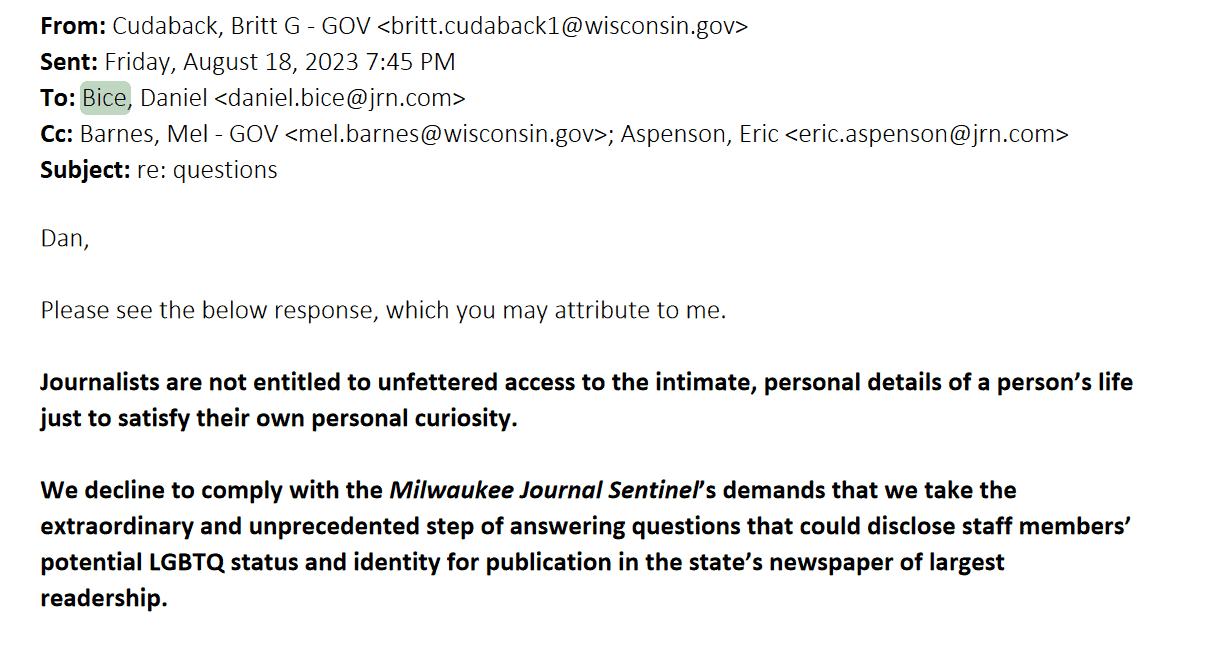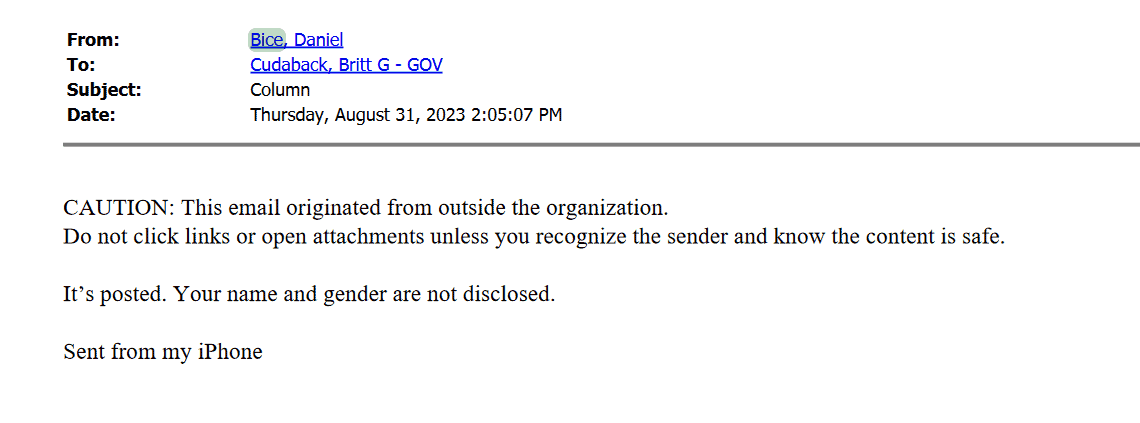In an epic 1,312-word email to Milwaukee Journal Sentinel reporter Dan Bice, Democratic Gov. Tony Evers’ Communications Director Britt Cudaback demanded that the state’s largest newspaper censor information about her alleged romantic relationship with Evers’ powerful Chief of Staff Maggie Gau, arguing that publishing the information could lead to anti-LGBTQ violence.
You can read Cudaback’s email in full for the first time later in this story.
The central argument in Cudaback’s email to Bice was that the newspaper should not write about an alleged supervisor-subordinate romantic relationship between public employees if those people are not heterosexual, as if a person’s sexual orientation renders them immune from any questions about their public roles.
“We decline to comply with the Milwaukee Journal Sentinel’s demands that we take the extraordinary and unprecedented step of answering questions that could disclose staff members’ potential LGBTQ status and identity for publication in the state’s newspaper of largest readership,” Cudaback wrote Bice in August 2023.
The emails reveal the increasingly frantic campaign by Cudaback and Evers’ office to stop the Journal Sentinel from reporting that Cudaback and Gau, her supervisor, were allegedly involved in a live-in romantic relationship that was causing consternation among members of the governor’s staff. Gau is so powerful that some people around the Capitol routinely refer to her as the “real governor.”

Cudaback even claimed publishing the abuse of power allegations could lead to Evers’ staffers being stalked, as she fielded Bice’s questions, which he was trying to direct to Gau. The email implied there was “no journalistic value or legitimate public interest” to whether Gau and Cudaback were dating.
That’s even though Cudaback admitted, “The communications director (Britt Cudaback) has reported directly to the chief of staff (Maggie Gau), and that continues to be the case.”
In a complete tangent, Cudaback even claimed that Gau responding to Bice’s questions about the supervisor-subordinate relationship could lead to the media questioning people about their disabilities or race.
“Thanks for the note,” Bice responded. “I would point out, however, that my questions were addressed to Maggie Gau, the office’s chief of staff. She did not answer my first question, which was, in short, is she in a romantic or sexual relationship with a staff member whom she supervises? If not, then there is no story. End of conversation. But if she is in such a relationship, has she granted promotions or pay raises to this staffer?”

In fact, there are several reasons a supervisor-subordinate relationship should warrant public scrutiny. In the event of any breakup or sexual harassment litigation, it would be taxpayers on the hook.
Bice reported that the situation is causing other state workers discomfort in the office; there are ongoing questions about whether anyone could question Cudaback’s performance.

In addition, both are taxpayer-funded employees, and many businesses and governmental offices have policies against supervisors dating subordinates. Cudaback received an “80% pay increase in four years,” according to Bice’s story. Furthermore, Evers has taken prior stances against sexual harassment in the workplace.
“Publishing staff members’ LGBTQ status and identity in your paper could directly cause and result in undue emotional and physical harm, including but not limited to harassment, stalking, targeting, and violence, among other concerning behavior, against members of our staff,” Cudaback wrote, saying that Bice could attribute the lengthy statement to her.
Bizarrely, the emails reveal, Cudaback was leading the governor’s office’s increasingly urgent PR response to Bice’s questions… about Cudaback’s own alleged romantic relationship with her supervisor, the governor’s chief of staff. Yet Evers’ office somehow convinced the Milwaukee Journal Sentinel to redact both Cudaback’s gender and name from their story, according to Bice’s email responses.
“It’s posted. Your name and gender are not disclosed,” Bice wrote Cudaback.

That’s despite the fact that Cudaback answered Bice’s questions for Gau, using the collective “we.” For her part, Gau responded to Bice by directing Bice back to the lengthy email written by…Cudaback, a fact that Bice did not tell readers.
The emails also show that Cudaback tried to go over Bice’s head, requesting a last-minute off-the-record discussion with Milwaukee Journal Sentinel Executive Editor Greg Borowski, who told Cudaback he was disappointed by “insinuations that our team is pursuing this for some prurient interest or somehow spreading the story around outside our newsroom.”

When Bice eventually ran the story, he did not report the full contents of the governor’s office’s attempts to get the newspaper to censor the story. The fact that Cudaback is the subordinate in question was subsequently revealed by WISN-1130 AM host Mark Belling, Wisconsin Right Now, and others.
The emails show that Belling and Bice were in a race to break the story, but, whereas Cudaback responded at length to Bice’s questions, Belling later wrote that the governor’s office ignored similar questions from the radio talk show host.
Belling sent his email to the governor’s office asking questions on the same topic, but there is no evidence in the records that they ever responded to him. Instead, Gau forwarded Belling’s email to Cudaback and Mel Barnes, Evers’ chief legal counsel.

“Maggie Gau, Evers’ longtime chief of staff and top aide, is not answering my questions about the nature of her relationship with Britt Cudaback, the governor’s communications director. Cudaback, who is Evers’ lead spokesperson, is also not responding to my inquiries,” Belling later wrote.

WRN received the communications between Cudaback and Bice through an open records request. We also received about 1,400 emails in response to a request for all communications between Cudaback and Gau. Read the emails here:
PR2023-097 and 098 – Responsive Records_Redacted
Those emails largely captured professional communications among Cudaback, Gau, and other members of the governor’s staff as they reviewed press releases and dealt with other matters of public business, such as trying to craft a narrative to explain why the governor was vetoing a tax cut on working and middle-class Wisconsinites. There is one text message from Gau about cookies not being left out to dry.
Bizarrely, Evers does not appear to be copied on any of the emails (and there is no sign of a redacted alias email or Warren Spahn communications), although many of the emails copy something called a “Gov DL Huddle.” It’s not clear whether the governor is part of it.
The Wisconsin Institute for Law and Liberty has filed an open records request seeking any communications members of the governor’s office may make using the app Signal.
Cudaback even asked Bice to stop asking people questions about the accusations. “Beyond the above, I am personally aware that these inquiries, relating background information, and certain allegations have been shared and discussed with about ten or more individuals, many of whom are my professional colleagues, not only within the Milwaukee Journal Sentinel newsroom but beyond it,” she wrote.
“We kindly request that the Milwaukee Journal Sentinel does not share, discuss, or otherwise disclose this information or relevant inquiries any further beyond necessary editorial staff, most especially with individuals who do not work at the Milwaukee Journal Sentinel, until and unless you conclude you plan to write this story,” she added.
Bice ended up reporting, “Sources said the relationship was creating a difficult environment in Evers’ office, especially because they believe no one can raise concerns to Gau about her partner.” He wrote that Evers “says it’s nobody’s business if supervisors in his office date subordinates.”
Bice mentioned Cudaback’s lengthy email, writing only that it was issued by Evers’ office and dramatically abridging it: “Last week, in response to questions from the Journal Sentinel Evers’ office issued a 1,300-word response when asked if Gau was in a romantic or sexual relationship with a particular subordinate on her staff. The statement skirted the issue of whether the pair of Evers’ employees are dating.” The article then summarized some of the email’s details on Cudaback’s promotions but left out the LGBTQ and violence claims. Here is the full email:
On Aug. 18, 2023, Cudaback wrote Bice:
Dan, Please see the below response, which you may attribute to me.
Journalists are not entitled to unfettered access to the intimate, personal details of a person’s life just to satisfy their own personal curiosity.
We decline to comply with the Milwaukee Journal Sentinel’s demands that we take the extraordinary and unprecedented step of answering questions that could disclose staff members’ potential LGBTQ status and identity for publication in the state’s newspaper of largest readership.
To do otherwise could not only affect the safety and well-being of our staff, but would set a dangerous, untenable precedent, enabling journalists to believe they are entitled answers to intrusive questions about employees’ personal lives, even in situations where there is no journalistic value or legitimate public interest. It would also open the door to future, increasingly intrusive inquiries about individual employees’ sexual orientation, gender identity, relationship status, health conditions, disabilities, religion, and ethnicity, among other personal information.
Our office does not comment on the martial (sic) status, religion, ancestry, sexual orientation, etc. of employees because we respect the dignity, humanity and privacy of each member of our team and because doing so could, in many circumstances, create legal liability. Moreover, the Milwaukee Journal Sentinel, by virtue of being a newspaper of record, has actual knowledge that anti-LGBTQ rhetoric, sentiment, and violence are on the rise and that publishing staff members’ LGBTQ status and identity in your paper could directly cause and result in undue emotional and physical harm, including but not limited to harassment, stalking, targeting, and violence, among other concerning behavior, against members of our staff.
Where members of the public and members of the press and the public are entitled to certain information regarding personnel and staff for the important purpose of ensuring transparency and accountability in state government, broad swaths of personnel information, documents, and correspondence relating to state business must already be made available as required by law.
Wisconsin state law creates a presumption of public access in service of government openness, transparency, and accountability and, unlike the Wisconsin State Legislature, nearly every part of state business in the executive branch is required to be retained and made available to press and the public, including staff salaries, calendars and schedules, email and text communications, and most other documents. Moreover, as a note for your background regarding referenced policies that are applicable, for example, to other branches of government: we recommend a closer review of those policies, including provisions providing the broad flexibility to deviate from said policies altogether.
Among documents already available for press and public viewing includes the organizational chart for the office of the governor. For at least more than a decade, spanning over the tenures of at least four chiefs of staff, at least seven communications directors, and both Republican and Democratic administrations alike, the communications director has reported directly to the chief of staff, and that continues to be the case. Here are existing, publicly available links that include organizational charts for the office of the governor over the course of the last decade, beginning as early as Sept. 17, 2012, when agency budget requests under the Walker Administration were due to begin preparing the 2013-15 biennial budget: 2013-15, 2015-17, 2017-19, 2019-21, 2021-23, and 2023-25.
For biennia preceding 2013-15, it appears organizational charts for agencies were not included in agency requests, but please let us know if you find you need additional historical records for the office of the governor preceding that time period.
Additionally, among documents that are likewise available for press and public viewing is the title, previous and current salary amounts, and position information of every state employee, including every person who works in the governor’s office. Since running for governor in 2018, the governor has had five communications directors, three in the office of the governor:
Sam Lau, campaign communications director, August 2018 – November 2018;
Carrie Springer, transition communications director, November 2018 – January 7, 2019;
Melissa Baldauff, communications director, January 7, 2019 – June 2020;
Sarah Hoye, communications director, August 2020 – November 2020; and
Britt Cudaback, communications director, November 8, 2020 – present.
The office of the governor is organized, structured, and managed for the purposes and benefit of the governor: meeting his needs and achieving his administration’s priorities. To the extent senior staff is aware of any dating or romantic relationships between staff in our office, the governor is aware of them. Any potential for conflicts, harassment, or legal concerns are evaluated on an individual basis based on the facts of any given situation. Further, it is the governor’s expectation that staff comply with all applicable Wisconsin statutes, ethics rules, and any other policies applicable to staff in our office.
I was officially appointed to deputy communications director in the office of the governor, effective January 7, 2019, at $62,000 annually. You will also note in the organizational chart(s) that the deputy communications director reports directly to the communications director, as is intuitive. I served as deputy communications director under all four of my predecessors and, during the entirety of my more than two years as deputy communications director, reported directly to the communications director in that role.
Of important note is that, despite expressing interest, I was passed over for a promotion from deputy communications director to communications director three different times—first during the post-election transition, again after the transition, and once again in the middle of the governor’s first term.
I was promoted to communications director effective November 8, 2020. The decision to promote me from deputy communications director to communications director was the governor’s decision and his decision alone. Notably, my starting salary when I was appointed as communications director in 2020 was $100,006.40, over $10,000 LESS than my two most recent predecessors when they began in the exact same role.
Any non-merit-based salary increases staff in the governor’s office receive are through general wage adjustments to adjust for inflation. Every state employee receives general wage adjustments as part of the state compensation plan, which is approved by the Wisconsin State Legislature. As it relates to merit-based pay increases staff in the governor’s office may receive, the governor is aware of and signs off on any merit-based salary increases or promotions for members of senior staff in the governor’s office. Importantly:
- I have received the exact same number of merit-based pay increases as other current senior staff members in the office of the governor.
- Other than the chief of staff, every member of senior staff who has served since January 7, 2019 has received four merit-based pay increases during that time period.
- Furthermore, my current compensation is entirely consistent with the compensation of my predecessors, and, in fact, is literally the exact same as the most recent person to hold this position before me:
- Melissa Baldauff served as communications director at a salary of $111,987.20 annually;
- Sarah Hoye served as communications director at a salary of $112,008 annually; and
- I was reappointed as communications director, effective January 3, 2023, at a salary of $112,008 annually.
- I make commensurate salary to both of my predecessors while managing a larger team than any of my predecessors did.
- My salary continues to be less than at least four other senior staff members despite the size of the team I manage.
Beyond the above, I am personally aware that these inquiries, relating background information, and certain allegations have been shared and discussed with about ten or more individuals, many of whom are my professional colleagues, not only within the Milwaukee Journal Sentinel newsroom but beyond it. We kindly request that the Milwaukee Journal Sentinel does not share, discuss, or otherwise disclose this information or relevant inquiries any further beyond necessary editorial staff, most especially with individuals who do not work at the Milwaukee Journal Sentinel, until and unless you conclude you plan to write this story.
On Aug. 21, 2023, at 3:01 p.m., Bice wrote Gau:
“Thanks for the note. I would point out, however, that my questions were addressed to Maggie Gau, the office’s chief of staff. She did not answer my first question, which was, in short, is she in a romantic or sexual relationship with a staff member whom she supervises? If not, then there is no story.
End of conversation. But if she is in such a relationship, has she granted promotions or pay raises to this staffer? When did she alert the governor to the fact that she is in such a relationship with a subordinate.
If Maggie could answer these question(s), I would appreciate it. I would also ask that Gov. Evers provide us with any comment he has on the matter. This is a simple story of accountability. Most businesses have policies banning supervisors from being in romantic or sexual relationships with staffers they supervise. The Journal Sentinel is asking if the Governor’s Office is operating contrary to this widespread policy, one that is in force throughout the UW System and in both houses of the Legislature.
As for asking people about their personal relationships, this is something I’ve had to do on several occasions while pursuing various news stories. Among those I’ve asked are former Milwaukee County Executive Chris Abele, former Gov. Tommy Thompson, Supreme Court Justice Rebecca Bradley, former Milwaukee Mayor John Norquist, Former Assembly Speaker Mike Sheridan and former Insurance Commissioner Robert Haase. In some cases, I wrote stories and in others, I did not, depending on the answers given to me. Thank you for your time. I look forward to hearing from Maggie.”
Aug. 23, 2023, at 10:28 a.m., Gau wrote to Bice, copying Cudaback and two others: “Per your last request, our office already provided on-the-record responses to your questions. We will continue to refer you to those responses.”
On Aug. 24, 2023, Cudaback wrote Journal Sentinel Editor Greg Borowski, copying Evers’ Chief Legal Counsel Mel Barnes. She wrote,
“Greg,
I hope you’re well. Our office would welcome the opportunity to have an off-record conversation directly with you before you decide to proceed with this story. We are also happy to have Rachel join if you would like her to be part of this conversation as well.
I understand that one or both of you are/have been out of the office, so we are happy to find time when you return and have caught up. If you’re willing and interested in having that conversation, please let us know when you might have availability next week and the following week, and we will try to coordinate with schedules on our end. Thank you for your consideration.”
On Aug. 29, 2023, Milwaukee Journal Sentinel Editor Greg Borowski wrote to Cudaback and JS Deputy Editor Rachel Piper, copying Evers’ Chief Legal Counsel Mel Barnes, and wrote,
“Hi Britt:
Thank you for your note. I am including Rachel Piper here. Happy to schedule something for later this week, but you should know up front: I view this as a legitimate line of inquiry as we try to determine if there is a story here and, based on the official response Dan shared, insinuations that our team is pursuing this for some prurient interest or somehow spreading the story around outside our newsroom are inaccurate and, frankly, disappointing. Please send a few times on Thursday or Friday that would work for a call.
Thank you,
Greg.”
On Aug. 31, 2023, Bice wrote Cudaback,
“How many employees are there in the Governor’s Office? The Blue Book says 37, but I think that is dated.
Thanks.
Dan.”
At 1:46 p.m. on Aug. 31, WISN 1130-AM host Mark Belling wrote Cudaback, copying Gau:
Ms. Gau and Ms. Cudaback
I have waited 24 hours since sending emails to each of you and have not received a response.
I sincerely would prefer not to file a voluminous open records request covering expense
accounts, communications, pay stubs, etc., and would prefer that my simple questions just be answered.
I have been told by multiple sources that the two of you have a close relationship. My own
employer bans all supervisors from having any type of close relationship with individuals that directly oversee or manage and that policy is in place at most major employers.
I am asking what the Evers administration policy is. What is the nature of your relationship? Is the Governor aware of your relationship and has he approved? Was Maggie involved in Britt’s promotion to lead communications director? Is Maggie the supervisor of Britt? Does the chief of staff oversee communications as part of the chief’s responsibilities?
I am aware that at least one prominent journalist has been inquiring on this and I have been told by individuals in Madison (I’m not normally in that gossip loop) that the relationship between the two of you is a widely discussed matter. I simply would like to get your answers as to what the relationship is and whether it is permissible under the governor’s office’s policies.
Mark Belling
WISN-AM
Milwaukee
On Aug. 31, 2023, at 2:05 p.m., Bice wrote Cudaback,
“It’s posted. Your name and gender are not disclosed.”
On Aug. 31, at 2:28 p.m., Cudaback wrote Bice and copied Chief Legal Counsel Mel Barnes and asked him to “please update your story to accurately reflect”:
“1. I receive the literal same compensation as my immediate predecessor since you failed to include that important context;
2. The governor and the governor alone decided to promote me to communications director, as we already indicated to you, so please include this, as well;
3. We’d ask you to remove your disclosure of how someone might find another person’s address using (a website) as doing so is not only not the appropriate use of that website but could well endanger other people well beyond our office, including survivors of domestic violence; and
4. We’d also ask you to include the following from our original statement “Journalists are not entitled to unfettered access to the intimate, personal details of a person’s life just to satisfy their own personal curiosity.”
At 2:39 p.m. on Aug. 31, Bice wrote Cudaback,
“I made the first three changes and republished. My editors will decide on whether we use the quote. I’ll get back to you in the next 10 minutes. Dan.”
On Aug. 31, 2023, at 2:54 p.m., Bice wrote Cudaback,
“My editors have decided that they don’t want me to insert the quote because they believe that nothing I wrote is about the ‘intimate, personal details of a person’s life just to satisfy
their own personal curiosity.’ I made the case that this situation is worthy of public discussion.
You are free to post that statement on social media or elsewhere. Thanks for the proposed revisions. I deleted the (website) reference and said Evers was the one who promoted you. I did write that the statement says you were passed over three times for a promotion and made $10K less than your predecessors when you became comms director.
Let me know if there is anything else you dispute. I might post the audio of the interview with the governor. But I need to review it to make sure your name did not come up.
Dan.”

































